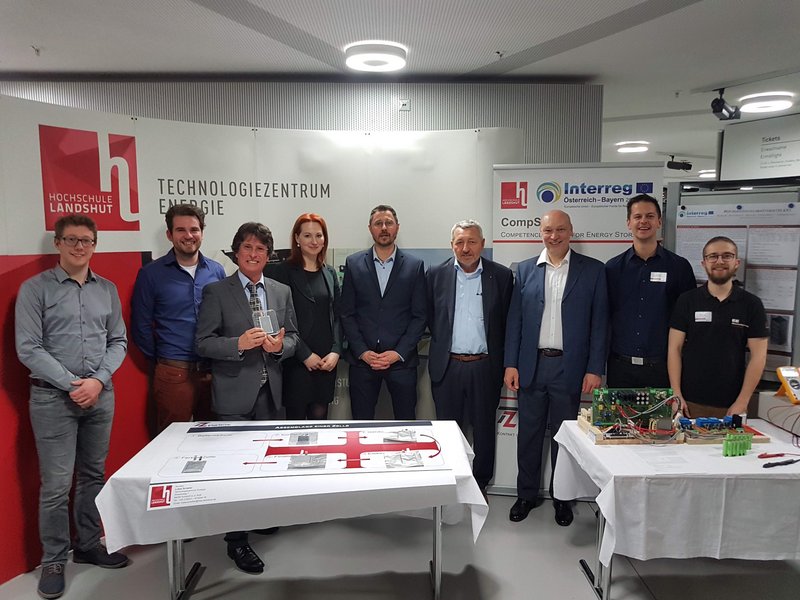Within the context of the energy revolution, electric storage devices are a key technology for the future. Since renewable sources such as wind and solar power cannot continuously generate power, a buffer is required to balance out any inconsistencies. Four years ago, therefore, Landshut University of Applied Sciences and the University of Applied Sciences Upper Austria in Wels started a cooperation project to pool their skills in the field of energy storage. The two institutions are now celebrating the successful conclusion of their project, CompStor - Competence Centre for Energy Storage. The cross-border cooperation comprises both teaching and research in the field of electrical storage devices. As part of the project a new building was opened at the Technology Centre for Energy (TZE) in Ruhstorf an der Rott with chemical and technical laboratories and a technology centre for cell manufacture and battery testing. In the Welios Science Centre in Wels, the University of Applied Sciences Upper Austria also set up state-of-the-art facilities for high voltage and high current testing. At the same time, the two universities devised a joint course offering for students, in order to train up-and-coming scientists in the region in the fields of battery technology, grid integration and protection technology. The EU funded the project to the tune of around 5.5 million euros.
Strengthening the entire region
Through the transfer of knowledge and joint research on storage batteries, the two universities have created a cross-border area of expertise for direct current technology and grid integration. “Questions about energy storage do not, after all, disappear at the national border along the river Inn. Securing the energy supply is, on the contrary, a matter of European interest,” emphasises Professor Dr. Karl-Heinz Pettinger, Project Head at the Technology Centre for Energy, “and none of our institutions can find the answers alone. Our cooperation pools knowledge of battery technology on the Bavarian side and the system use knowledge of the high-voltage direct current technology on the Austrian side.” For Lower Bavaria and Upper Austria this means strengthening the region, new stimuli for innovations and improving international visibility.
Benefits for industry, students and researchers
The institutes involved stand out as a point of contact for questions from industry, business and politics and act as an independent advisory centre on the subject of electrical storage systems. Over and above this, the cross-border research, teaching and innovation platform offers countless opportunities for interaction, both for the two universities and for regional businesses in Lower Bavaria and Upper Austria, who are able as a result to better network and make use of synergy effects. The results and findings from the joint research project also flow directly into teaching at the universities. “As a consequence, our students are always up to date and excellently qualified for promising future careers in the energy sector,” explains Pettinger. This, in turn, also benefits the region, as in the long term, jobs will be created based on the key technology of battery systems.
About the Project
The CompStor - Competence Centre for Energy Storage project commenced in 2015 and concluded at the end of March 2019. The project lead at Landshut University of Applied Sciences was Prof. Karl-Heinz Pettinger, scientific head of the Technology Centre for Energy in Ruhstorf an der Rott. The University of Applied Sciences Upper Austria in Wels was the university’s partner in the project. Professor Dr. Peter Zeller, head of the Electrical Engineering programme, played a significant role in the cooperation. The European Fund for Regional Development (EFRD) financed the project to the tune of around 5.5 million euros. Around 1 million euros were contributed by the institutions from their own budgets.
Project partners: | Landshut University of Applied Sciences, Energy Technology Centre FH Oberösterreich Forschungs & Entwicklungs GmbH |
Overall Project Management: | Prof. Karl-Heinz Pettinger |
Programme: | Interreg Austria-Bavaria 2014-2020 |
Total project funding: | 5.5 million euros |
Financing: | European Fund for Regional Development (EFRD) |
?Photo: Landshut University of Applied Sciences(free to use if source cited)
IMAGE1: Two universities - one project: the participants from Lower Bavaria and Upper Austria are very pleased with their successful research and teaching cooperation project
IMAGE2: At the TZE at Landshut University of Applied Sciences everything revolves around the subject of battery storage - one of the key technologies for the future of energy supply.
IMAGE3/4: With the help of new chemical and technical laboratories, the TZE is able to produce small batches of lithium cells for research. (links: Glovebox, right: Impact of a tesla transformer in a glass of water)
IMAGE5: Professor Dr. Peter Zeller from the University of Applied Sciences Upper Austria and Professor Dr. Karl-Heinz Pettinger from Landshut University of Applied Sciences prepare the new high voltage systems in Wels for the forthcoming lightning test during the opening celebrations.

